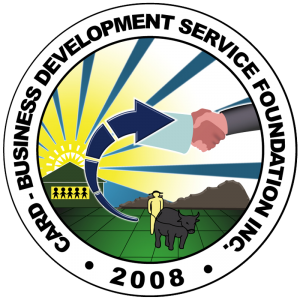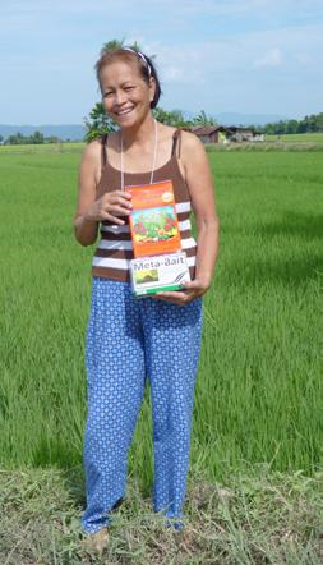Maria Calilap
Input supplies = rice and more
It was on April 2, 2002 when Maria Calilap became a CARD member. She was so glad that finally she was taken in. She attempted to apply for CARD membership years before but her application was denied because her assets were more than the P50,000-limit set by CARD. Now she is not just a member, she is also the Center Chief of Samahang May Sipag at Tiyaga in their barangay.
Nanay Maria and her husband are growing IR 160, RC 18 and RC 28 rice varieties on a 15-hectare lot under a tenancy agreement. The couple practices relay planting not only to distribute costs and labor but also to ensure a year-round supply of rice, thus a steady source of income. Nanay Maria spends a total of P100,000 for inputs, P70,000 of which goes to chemical inputs. The remaining P30,000 goes to labor. She has five regular employees which she beefs up during important farming operations such as land preparation, weeding and harvesting. The farm produces1,050 to 1,425 cavans (52,500 – 71,250 kgs) for an estimated annual income of around P700,000 and an annual net profit of around P250,000.
Nanay Maria’s initial loan of P2,000 was used as additional working capital which allowed her to produce more rice. Happy with the increase in her harvest, she became more confident that she can produce higher knowing that CARD was there to help her. Her next loans of P10,000 and P40,000 were both promptly paid. In 2006 when she became a BDS member and a beneficiary of the Agricultural Trading Program ( ATP), she became eligible for a P60,000 loan, however, she was offered a credit line of P150,000 – P200,000.
Financing the production activity is only secondary to the main objective of the ATP which is to help the producer sell his produce. Since joining the ATP, Nanay Maria has not had any problem in marketing because all of her harvest goes to a rice miller-trader consolidator in the town. BDS even adjusted the payment term of her loan to the rice production cycle. Aside from marketing assistance, ATP also provided support in terms of input supply sourcing. Nanay Maria finds this program very valuable because the survival of her business heavily depends on the availability and accessibility of inputs like fertilizers, herbicides, and pesticides such as molluscides. ATP beneficiaries in Victoria, Oriental Mindoro initially bought their input supplies in Calapan, Oriental Mindoro. The trips to Calapan cost P800 for the first two months of pre- and production operations and P300 in the latter two months. Aside from the transport cost, the trips also take Nanay Maria’s time away from household and farm work. Such concerns were not only for Nanay Maria but for all the other BDS-ATP beneficiaries. In her capacity as Center Chief, Nanay Maria aired these problems to BDS. In consideration of such difficulties, BDS decided to look for suppliers within Victoria.
Now Nanay Maria obtains her farm inputs from an accredited dealer in Victoria. The total amount of these input withdrawals are payable within four months with an interest rate of 2.5%. What Nanay Maria particularly liked in this arrangement is that she is able to get all her input needs from one supplier nearby, at a low interest rate and with a payment term which coincides with her crop’s production cycle. In addition to this, processing of her orders does not take a long time. She just sends a text message to the dealer who then informs her when her order is ready for pick-up which usually takes one week. “I am happy now knowing that farm inputs are available when I need them. On top of this, I don’t have to spend much nor travel long to get them”, Nanay Maria says with a
grin.
To date, Nanay Maria is in her 9th year as CARD member and 4th year as BDS-ATP member. This program has helped her and her family in so many ways. Since her membership, her rice farming business has experienced continuous growth in terms of productivity which she estimated to be 50-70%. Though her husband got sick and was not able to actively help in the farm, the business survived because of the ready financing for input supplies and the marketing system which have already been put in place through the ATP. The couple was able to send their children to school, two of whom earned degrees in Hotel and Restaurant Management and Computer Science.
Nanay Maria is not alone in reaping benefits. As a result of her farm’s increased productivity, she was able to provide livelihood to more people who were involved in the various aspects of rice production and trading. The ripple effects are evident and Nanay Maria attests to this as she continues to recruit others to join CARD BDS.
For Nanay Maria, BDS-ATP support does not only translate to easy access and lower costs of sourcing supplies, but more importantly, to other nonmonetary benefits. Since her CARD membership, Nanay Maria has acquired confidence, leadership skills, self respect and the values of volunteerism. Her being a Center Chief has brought her opportunities for interacting with other people. This has fired her enthusiasm in dreaming of bigger things. More than the economic benefits she gained from BDS, she treasures the self-confidence and empowerment she has acquired.
When asked whether her business can already survive even without BDSATP support, Nanay Maria cheerfully said, “Yes we can because CARD BDS has
helped us all the way. However, I am not yet ready to sever my ties with them because I consider them as an important partner and I want to continue this partnership to further the growth of our business, our center and our community.”
~ Maria Calilap

